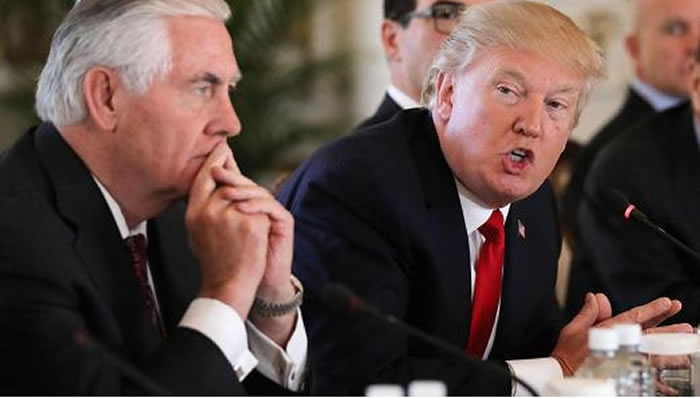In yet another major shake up of his administration, Trump, via Twitter, has declared that he will be replacing Secretary of State Rex Tillerson after only fourteen months, the shortest occupation of the position in modern history. Tillerson will be replaced by CIA Director Mike Pompeo after months of both public and private disputes between the former head of Exxon Mobil and the US President. Administration officials have claimed Tillerson was unaware of his imminent release, allegedly learning only briefly of his impending firing.
For those who have been keeping up to date with the inner machinations of the controversial administration, it is concurrently unsurprising that Tillerson has met this fate, and surprising that it has taken this long. The myriad of disagreements between the President and his (now former) Secretary of State were public knowledge, the most recent being Trump’s expeditious acceptance to meet with North Korea’s Kim Jong-Un without any prior consultation from his State Department.
The argument could be made that Tillerson has acted as a bulwark against Trump’s reactive nature and his desire to hastily and garishly enact foreign policy decisions. For many, Tillerson represented a voice of moderation within a tumultuous administration; with his tenure now at an end, one can’t help but wonder if we will witness a seismic shift in the direction and implementation of this administration’s foreign policy. Below, the three major issues on which Rex Tillerson and Donald Trump have publicly come to loggerheads are briefly outlined.
The Iran Nuclear Deal
On the Iran Nuclear Deal, Trump publicly stated just hours after his dismissal of the Secretary of State that he and Tillerson were at odds on this affair. “When you look at the Iran deal, I think it’s terrible,” Trump stated. According to the President, Tillerson believed that “it was okay. I wanted to either break it or do something, and he felt a little bit differently. So we were not really thinking the same.”
Executed under the Obama administration, The Iran Nuclear Deal was a legal framework reached in 2015 between Iran and the P5+1, the five permanent members of the UN Security Council (America, the UK, France, China and Russia), plus Germany, as well as the European Union. In exchange for lifting all nuclear-related economic sanctions that would free up tens of billions of dollars in oil revenue, Iran would agree to redesign, convert, and reduce its nuclear facilities, which have long been a point of contention among Middle-East countries and beyond.
Trump, in seeming defiance of anything initiated under Obama, has sought to revoke the deal, stating his intention throughout the 2016 presidential campaign to withdraw from the legal framework despite offering no viable alternative. Tillerson, however, was committed to working within the framework of the existing deal. He cautioned a more reasoned and diplomatic approach. “The greatest pressure we can put to bear on Iran to change the behavior is a collective pressure,” a goal which was to be achieved by continuing to work in conjunction with other nations, as opposed to adopting the Trump idiosyncrasy of acting unilaterally. Pompeo, in comparison, has in the past referred to Iran as a “thuggish police state” and that Tehran was “intent of destroying America.” In November 2016, the former CIA Director declared that the nuclear deal was “disastrous” and that he was looking forward to “rolling back” the agreement.
Paris Climate Agreement
Reversing another Obama-era position, in June of 2017 President Trump announced that the US would be exiting the Paris climate agreement, inciting global condemnation. Overwhelming disapproval was launched at the second largest emitter of greenhouse gases, with claims that it was acting fecklessly rejecting what many nations see as necessary progression towards a greener planet. Trump argued that the agreement hindered the US to the benefit of its allies, with American taxpayers and workers being forced to suffer the fate of job losses and closing factories. The President stated that his nation’s contributions to the green climate fund were “costing the US a vast fortune.”
Endeavoring to soften the impact of Trump’s brash decision a few weeks later, Tillerson suggested that the administration had softened its approach, and that the US would be willing to remain in the climate deal. “I think under the right conditions, the president said he’s open to finding those conditions where we can remain engaged with others on what we all agree is still a challenging issue,” he said on CBS’s “Face the Nation.”
Perhaps attempting to walk-back the severity of Trump’s decision, recognizing the damage that it had done to the prestige of a United States already mired in controversy, it is unsurprising that Tillerson’s approach to the issue was more conciliatory in tone. In response, and in direct contradiction to, the Secretary of State’s declaration, the White House denied the reports that the President’s position on the issue had shifted, with the deputy press secretary dismissing this perceived alteration: “There has been no change in the United States’ position on the Paris agreement. As the President has made abundantly clear, the United States is withdrawing unless we can re-enter on terms that are more favorable to our country.”
With the withdrawal of the US from the agreement officially taking place in 2020, it still remains to be seen if any renegotiations will take place. It will be interesting, or frightening, to see how Mike Pompeo, an avid climate change denier, addresses the issue.
North Korea
Long a point of international contention, the disparate approach between President Trump and Rex Tillerson with regard to North Korea has recently resurfaced. In early March of 2018, it was announced that a historic meeting would take place between President Trump and Kim Jong-Un in relation to the regime’s nuclear disarmament. These talks will represent the first time ever that a sitting US president has met with a North Korean leader. Officials in the administration hope that a US-North Korea summit meeting will take place prior to the end of May.
While diplomatic talks between the two nations are undoubtedly a progressive step in securing international peace, the President and the Secretary of State had been at loggerheads over how to advance towards such an objective. Tillerson is one of the few members of Trump’s administration to be vocally supportive of talks with North Korea, offering the nation a chance to engage in diplomatic talks in August of 2017:
“We do not seek a regime change, we do not seek a collapse of the regime, we do not seek an accelerated reunification of the peninsula, we do not seek an excuse to send our military north of the 38th Parallel […] We are trying to convey to the North Koreans: ‘We are not your enemy, we are not your threat. But you are presenting an unacceptable threat to us, and we have to respond.’”
Trump, however, had not found Tillerson’s views to be in line with his own. Over the past year, Trump has displayed an increasingly hawkish view towards North Korea, insisting that Tillerson was “wasting his time” in seeking to negotiate with the regime. Pompeo, on the other hand, appears to embrace Trump’s antagonistic style of arbitration with respect to North Korea, a facet of the former CIA Director that the President undoubtedly finds appealing. In sharp contrast from Tillerson’s moderate tone, Pompeo on March 11 was insistent that appeasement for North Korea was not forthcoming: “Make no mistake about it, while these negotiations are going on, there will be no concessions made.”
Following a familiar pattern of Trump appointees, Pompeo is an untested diplomat, and doubts have been raised about whether he is up to the challenge of dealing effectively with the North Koreans. Pompeo represents a Secretary of State who is ostensibly more agreeable to Trump’s views, and the difference in ideology of how to most productively engage North Korea was perhaps the straw that broke the camel’s back of Tillerson’s tenure in an undulating administration. Although the criticism was regularly fired at Tillerson that he was ineffective in his position at Secretary of State, many pundits are fearful of what may occur with the appointment of someone who is more amenable to Trump’s viewpoints.
Better the devil you know than the devil you don’t.
This post appeared originally on March 13th, 2018 on Benjamin Moore’s blog Son of Gotham, where he writes about International Relations, Diplomacy and Politics.







